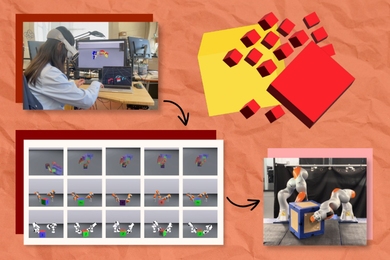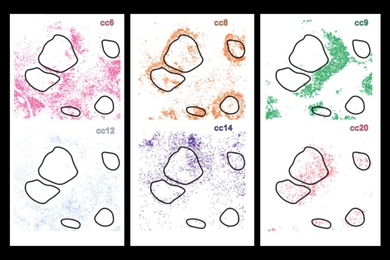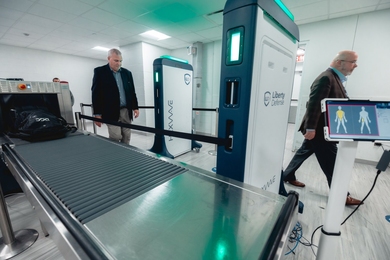Nurse care managers in MIT Medical's new Community Care Center work primarily at desks — rather than at hospital beds — but they take care of more patients in a day than they ever did before.
The Community Care Center (CCC) operates in the same fourth-floor space of Building E23 as the former 18-bed Inpatient Unit (IPU), and all five CCC nurse care managers are former IPU nurses. But now, rather than focusing solely on direct patient care in the unit, they look at the bigger picture, making sure that their patients get all the care they need no matter where they are — after a hospital stay, following an emergency room visit, or recuperating from an illness or injury at home or in their dorms.
The nurse care managers also treat a few outpatients during the day on site in the CCC — administering intravenous fluids or providing wound care, for example. But their new roles in care management (a growing specialty in nursing), for which they received extra training, involve them in all aspects of a patient's treatment and follow-up. "There's definitely a learning curve involved, even with all my years of experience," said Cathy Dwyer, R.N., who has been a nurse for 35 years.
A complex medical system
A typical day for a CCC nurse care manager involves numerous phone calls: to patients to see how they're doing; with other medical facilities; with health care providers at MIT Medical and elsewhere; with visiting nurse associations; and perhaps with family members (with the patient's consent). The medical system can be very complicated to negotiate, and the nurse care managers are expert advocates. The goal is to ensure that patients get the right care at the right time and in the right environment.
To help manage changing care needs, particularly from hospital or rehab center to home, the CCC follows patients who are currently in the hospital or at an emergency room, those who have been discharged in the past week, and longer-term patients who are elderly or have chronic conditions. In November and December (the CCC's first two full months of operation), a total of 379 patients benefitted from its services.
The CCC in action
When MIT undergraduate Beverly Cope, a sophomore in brain and cognitive sciences, suffered a broken leg after being hit by a motorcycle, the CCC got involved immediately. Cope was taken from the scene to Cambridge Hospital by ambulance and had surgery to have a titanium rod placed in the leg. After a two-night stay, she went back to her dorm room in McCormick Hall.
Cope, who will be using crutches and a wheelchair for several weeks, is getting help from Kim Carroll, B.S.N., R.N., the CCC's lead nurse care manager who previously held a similar position in MIT Medical's Internal Medicine Service. Carroll is making sure that Cope gets the follow-up medical care her doctors prescribe, as well as other services she needs because of her injury. Initially, that meant working with Student Disabilities Services to make sure her dorm was speedily equipped with grab bars in the shower and had the spring on one of the heavy bathroom doors removed.
Carroll later visited Cope in her dorm to make sure everything was OK. "She was great. She brought some supplies and helped me figure out how to do the shower thing with a broken leg," Cope said.
Since getting around on a snowy campus in a wheelchair can be "kind of a hassle," Cope noted, Carroll also obtained taxi vouchers for her and helped with other transportation arrangements, making things as easy as possible during a challenging time.
The nurse care managers make "house calls" only to students, but they also work with several home care agencies in the area to make sure other patients also get everything they need.
"There's a lot to do — the day just flies by," Dwyer said.
The Community Care Center (CCC) operates in the same fourth-floor space of Building E23 as the former 18-bed Inpatient Unit (IPU), and all five CCC nurse care managers are former IPU nurses. But now, rather than focusing solely on direct patient care in the unit, they look at the bigger picture, making sure that their patients get all the care they need no matter where they are — after a hospital stay, following an emergency room visit, or recuperating from an illness or injury at home or in their dorms.
The nurse care managers also treat a few outpatients during the day on site in the CCC — administering intravenous fluids or providing wound care, for example. But their new roles in care management (a growing specialty in nursing), for which they received extra training, involve them in all aspects of a patient's treatment and follow-up. "There's definitely a learning curve involved, even with all my years of experience," said Cathy Dwyer, R.N., who has been a nurse for 35 years.
A complex medical system
A typical day for a CCC nurse care manager involves numerous phone calls: to patients to see how they're doing; with other medical facilities; with health care providers at MIT Medical and elsewhere; with visiting nurse associations; and perhaps with family members (with the patient's consent). The medical system can be very complicated to negotiate, and the nurse care managers are expert advocates. The goal is to ensure that patients get the right care at the right time and in the right environment.
To help manage changing care needs, particularly from hospital or rehab center to home, the CCC follows patients who are currently in the hospital or at an emergency room, those who have been discharged in the past week, and longer-term patients who are elderly or have chronic conditions. In November and December (the CCC's first two full months of operation), a total of 379 patients benefitted from its services.
The CCC in action
When MIT undergraduate Beverly Cope, a sophomore in brain and cognitive sciences, suffered a broken leg after being hit by a motorcycle, the CCC got involved immediately. Cope was taken from the scene to Cambridge Hospital by ambulance and had surgery to have a titanium rod placed in the leg. After a two-night stay, she went back to her dorm room in McCormick Hall.
Cope, who will be using crutches and a wheelchair for several weeks, is getting help from Kim Carroll, B.S.N., R.N., the CCC's lead nurse care manager who previously held a similar position in MIT Medical's Internal Medicine Service. Carroll is making sure that Cope gets the follow-up medical care her doctors prescribe, as well as other services she needs because of her injury. Initially, that meant working with Student Disabilities Services to make sure her dorm was speedily equipped with grab bars in the shower and had the spring on one of the heavy bathroom doors removed.
Carroll later visited Cope in her dorm to make sure everything was OK. "She was great. She brought some supplies and helped me figure out how to do the shower thing with a broken leg," Cope said.
Since getting around on a snowy campus in a wheelchair can be "kind of a hassle," Cope noted, Carroll also obtained taxi vouchers for her and helped with other transportation arrangements, making things as easy as possible during a challenging time.
The nurse care managers make "house calls" only to students, but they also work with several home care agencies in the area to make sure other patients also get everything they need.
"There's a lot to do — the day just flies by," Dwyer said.






